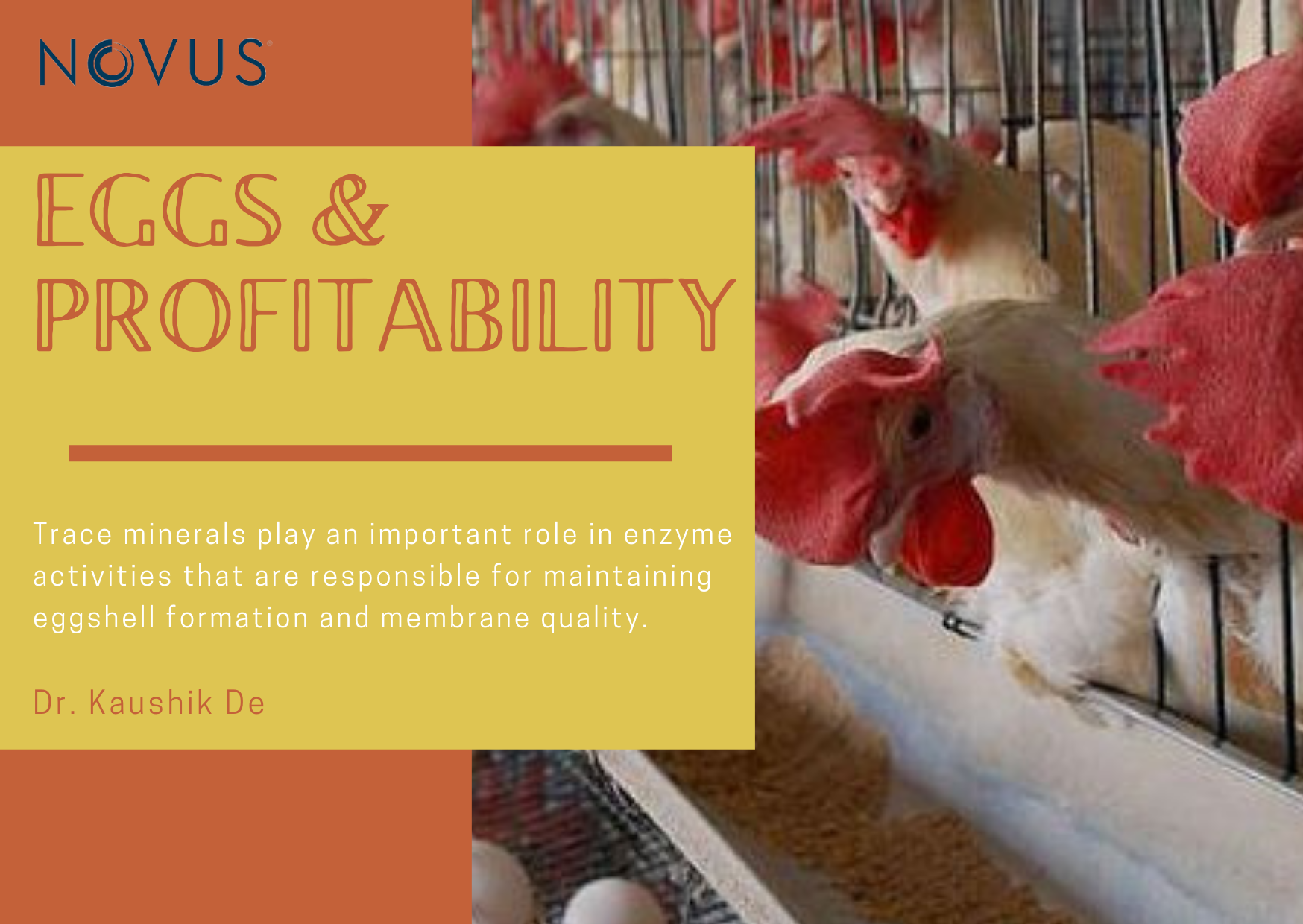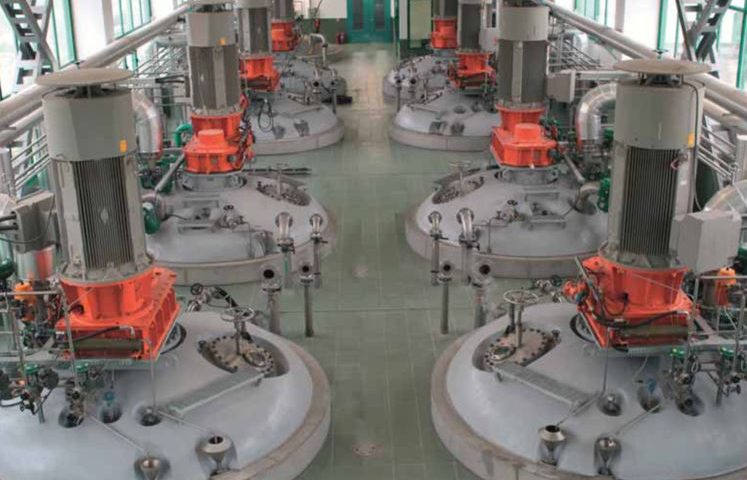
Technical Service Director – SCA
Novus International
Importance of Eggs:
Eggs are an amazing self-contained food source. Each one represents the most complete source of protein available in a single form. That’s why it is so important to meet the needs of a growing population by consistently providing eggs that are of the highest quality, both internally and externally.
The eggshell quality is very important for the profitability of the layer operations. The target is to have the best eggshell quality during the whole life of the layers for having the biggest number of saleable eggs. Having a premium eggshell quality will allow having more saleable eggs. For good egg production, we need to produce the best pullet quality. The optimum characteristics of a premium pullet quality are body development and good immunity status.
Whether they are bound for the table or a hatchery, high-quality eggs begin with a well-structured hen nutrition program. Maintaining mineral balances supports shell strength, the internal structure of the egg, and the tissue integrity of the unhatched chick. And, as laying hens age, mineral nutrition plays an increasingly important role, ensuring the continued production of plentiful, high-quality eggs and the overall well-being of the hen. Optimal nutrition means optimal performance.
Trace Mineral in eggshell formation:
The stages of eggshell mineralization are consecutively progressed in the distal portion of the isthmus (or red isthmus/tubular shell gland) through calcification at charged nucleation sites on the surface of the outer eggshell membrane. Then, organic aggregates are deposited on the surface of the outer eggshell membranes, where calcium carbonate spontaneously begins to precipitate in the form of calcite, and then microcrystals of calcite are arranged to form the shell attached to the outer membrane. When these processes are complete, the eggshell has a well-orientated structure that is described as the mammillary cone layer, the palisade layer of the mineralized shell with the main component of calcium carbonate, and the cuticle composed of glycoprotein.

If we see the Calcification process of the Eggshell it has two parts, the calcium shell, and the collagen membrane where the calcium shell will be deposited on. The strength and the structure of the collagen are influenced by the Zn, Cu, and Mn. Using MINTREX in the diet will improve the structure of the collagen, making a better “basement” for the calcium crystal that will be deposited on top. The amount of Ca in small and big eggs is similar, so this collagen membrane will be more and more important as the eggs get bigger and the amount of Ca/cm2 decreases.
The calcium amount will depend on the balance of Ca/P/Vitamin D of the diet and the deposition of the Ca will depend on several enzymes where the co-factors are Zn, Cu, and Mn. A highly Bioavailable Chelated Mineral will provide the right levels of trace minerals for the activity of these enzymes.
Trace Mineral in Bone Structure: Bone has basically two Matrix. Organic Matrix is the basal structure of the bone and is a bonding of multiple fibers, mainly collagen fibrils (fine fiber, approximately 1 nm diameter). The collagen fibrils are type I collagen; produced by the osteoblast, a specialized fibroblast. Collagen represents approximately 80 to 90% of the organic matrix

– Inorganic part: it gives strength to the bone. It’s composed of hydroxyapatite crystals (Ca10[PO4]6[0H]2). These crystals are produced due to osteoblast activity.
During bone development Ca and P are very important but also the trace minerals play a key role in this process:

Highly Bioavailable trace mineral helps improve the collagen cross-linking and ossification in the bone tissue matrix.

if we split it down the bone structure in smaller components, at the end we will see a matrix formed by collagen & intrafibrillar matrix and areas where Ca & P are deposited in the spots. Cu & Zn are important for the development of collagen and nanocrystals and Mn for the IFB matrix. A highly bioavailable chelated mineral will ensure proper formation of Collagen and intrafibrillar matrix and thereby ensure proper Ca & P deposition.
Common Problems in Eggshell:

Economic Losses due to Poor Egg Shell quality & Egg Breakage:

How Much Trace Mineral is squeezed by Egg?
The feed of commercial layer and breeder can easily cause trace mineral deficiency in bird. Normally these diets contain high amount of Ca & phytate Phosphorus which is around 0.4-0.5% considering usage of bran in layer diet.
Let’s see below example,

Now let’s take Zn as an example and see how much of Zn is getting excreted and Absorbed through the feed.

From this example, we can analyze a significant amount of Zn is getting excreted in the environment.
Bis Chelate in Improving eggshell breaking strength: MINTREX Chelated trace mineral is the only globally available bis chelate having a 2:1 metal to ligand ratio and a neutral charge ensuring the metal has maximum protection. Novus experience has shown that when we use MINTREX minerals at the reduced dosage (Zn: Cu 20:4) it can improve the eggshell breaking strength and can replace the high level of ITM (Zn: Cu 80:16)

Egg Shell Surface is smoother in MINTREX Group & denser than Control group.


MINTREX improves eggshell strength and eggshell thickness in layers.

A trial comparing a diet supplemented with MINTREX and a normal feeding program showed improved eggshell quality late inlay, as well as improved egg weights without compromising shell strength. Comparisons with both inorganic trace minerals and other organic trace mineral sources indicate MINTREX improves tissue supply of zinc, copper, and manganese, and has a direct beneficial effect on connective tissue and bone development in poultry.


In layers, these effects support improved bird health, eggshell strength, and egg quality factors which are critical to today’s industry performance parameters. Novus meta-analysis of various research globally have shown that the inclusion of MINTREX improves Eggshell quality by

Conclusions:
Egg quality, both internal and external, determines the degree of profitability in commercial layer operations. Trace minerals play an important role in enzyme activities that are responsible for maintaining eggshell formation and membrane quality. The risks associated with trace mineral deficiency include reduced egg mass and poor eggshell quality.
For any layer operation, getting more saleable eggs is the key to increasing profitability. Challenges such as dirty eggs, broken and weak shells can lead to poor interior quality, due to potential contamination from external pathogens. The most effective way to achieve the highest production possible is by boosting flock performance through optimal nutrition.
In addition to performance improvements, feeding layers a special mineral-enriched diet can enhance the mineral content of eggs they produce. Zinc, copper, and manganese can be passed on to the egg in higher levels, provided the animal is fed a highly bioavailable source of those trace minerals. Consumers eating these eggs will then have the added benefit of consuming more healthy minerals in their diet. Only MINTREX chelated trace minerals consistently deliver more essential trace minerals to the bird, while also minimizing mineral excretion. That translates into healthier layers, more efficient production, and ultimately, improved profitability for the producer.





